POLICY QUESTIONS FOR AUNG SAN SUU KYI
By Roland Watson
www.dictatorwatch.org
June 6, 2012
Aung San Suu Kyi has just visited Thailand. During her trip she was once
again treated with adulation appropriate for a queen, and to which she
responded with queen-like vague but feel-good pronouncements. However, Daw
Suu is no longer only a subject of idolatry; she is now a hands-on
politician - an MP. It is not enough for her to make non-specific and
hence empty statements. She has to convey clear policy points for the many
critical problems facing Burma. This is her responsibility as a leader,
and also the means by which the people of the country, now formally her
constituents, will evaluate her performance and hold her accountable.
The most important policy issues are as follows:
Sanctions
The main purpose of her trip was to speak at the World Economic Forum,
which is a collection of business leaders. Through this engagement, she
effectively restated her support for ending economic sanctions against
Burma’s military regime. It is critical to note that this specific policy
position is at odds with much of the pro-democracy movement, including the
ethnic nationality leadership in organizations such as the UNFC and KNU,
which issued statements calling for a continuation of the sanctions.
Development
Daw Suu’s remarks at the WEF sent mixed messages on the issue of
development, specifically development by foreign corporations. Her
participation at the event was obviously an affirmation of pro-development
policy, and also her concern about joblessness in Burma. (It is extremely
significant that she did not focus on human rights.)
On the other hand, she warned against reckless optimism, although this
applied more to Burma’s overall supposed reform, rather than commercial
development per se. About this statement, I must say that it demonstrates
remarkable naivete. The reason there is great enthusiasm by international
corporations about Burma, and by the corporations’ diplomatic promoters,
is Daw Suu herself. In Bangkok she was therefore complaining about
something for which she is personally responsible. Nothing has really
changed on the ground. There are still Burma Army atrocities, political
prisoners, religious persecution - the list goes on and on. The only true
substantive event has been her change of heart, including that she trusts
Thein Sein and is “happy.”
What is more sinister, though, is that Daw Suu backs Thein Sein’s policy
to put development before a political solution to the country’s problems,
meaning democracy and federalism. She has said that it will take a long
time for the people of Burma to achieve their goal. By adopting this
policy she is making her statement self-fulfilling.
She is also now directly in opposition to the ethnic nationality groups,
and others, which have said that they want a political solution first.
They recognize that development is driving conflict and human rights
abuses, furthering corruption, and enriching the regime.
Moreover, it is notable that she is silent on major projects such as
Myitsone, other dams, the huge Tavoy project, the Dawei port and pipeline,
the Kaladan intermodal project, new resource extraction, etc. Indeed, the
Thai authorities no doubt viewed her trip as support for Tavoy, which is
being built by ItalThai. As far as development driven jobs are concerned,
however, many people would agree that a better course would be to focus on
the political solution, to free the country, after which the people of
Burma can set up their own companies and work for themselves. This is far
preferable to being exploited within their own borders by Thai, Chinese,
Singaporean, Indian, Japanese, South Korean, European, Australian, and
American corporations.
Also, the question should be asked: What is Daw Suu’s position on
environmental conservation? Unfortunately, it seems that she is opposed to
it, since the development path that is now underway in Burma will
unquestionably continue the country’s legacy of ecological devastation.
Migrant workers
A related issue is the exploitation of the millions of Burmese who have
fled to neighboring countries to work as migrant laborers, and who have
been exploited terribly in the process, with many forced into nothing less
than slavery. In Thailand she did visit with migrant workers, and
expressed unease about their treatment to Thai government officials,
notably Chalerm Yubamrung. Again, though, Daw Suu is naive, if not
incredibly poorly informed, if she thinks that Chalerm, right-hand man of
dictator-in-exile, Thaksin Shinawatra (who is pals with Burma’s still
Senior General Than Shwe, and a secret promoter of Tavoy), has sincere
concern for Burmese migrants. The Thais like having large numbers of
foreign workers to exploit. The government will never give this up
willingly, or even push for material improvement in their conditions. If
Daw Suu wants to make this a signature issue, she will have to urge it
again and again. Otherwise, her comments can only be viewed as
self-serving, to make it look like she really cares.
Armed struggle
To-date, Daw Suu has been silent about Burma’s civil war. It was therefore
extremely disappointing that she was not allowed to meet the ethnic
leaders in Mae Sot. This would have given her the opportunity to explain
her position on their struggle. Because of this, many questions remain
unanswered, including:
Does she view a self-defense struggle as legitimate, or does she agree
with Thein Sein that the ethnic resistance forces are terrorists?
Would she ever support a true liberation struggle, such as the one that
freed Libya? (The answer here clearly is no.)
What is her policy on the war in Kachin and Northern Shan States and the
associated humanitarian crisis? Does she believe that the Burma Army is to
blame, or not?
Is she aware that the Burma Army is taking advantage of the Karen
ceasefire to resupply and reinforce front line units, that human rights
abuses in Karen State such as forced labor and land thefts are continuing,
and that there have also been a few clashes with the KNLA? Does she
support a pullback of Burma Army troops from the ethnic areas?
What does she think of the imminent UNFC June 10 deadline to reconsider
their ceasefires if the Burma Army’s aggression against the Kachin is
ongoing as of that date?
Why doesn’t she support an international inquiry and tribunal for the
regime’s war crimes?
Refugees
As with the migrant workers, Daw Suu also expressed concern about the
refugees from Burma living in camps in Thailand. She admirably said that
they should not have to return until there is peace, and implied that any
such return should be voluntary. She further said that she would push for
the recent reduction in their food rations to be restored.
(Note: She has never discussed the Rohyinga refugees in Bangladesh.)
Here, she can have a direct and immediate impact. The cut in food rations
has been implemented by Europe. A Norwegian deputy foreign secretary
recently had to defend himself in Chiang Mai from claims by activists that
Norway and other European donors are trying to starve the refugees out of
the camps to pave the way for development and to force the ethnic
resistance groups to accept the regime’s 2008 Constitution. Daw Suu, who
frequently meets with European diplomats - she is traveling to Europe in
just one week, can easily make the point that the rations should be
restored, and that refugee resettlement has to wait until there is real
and enduring peace.
This is actually a policy point over which she can be held accountable. If
the refugee funding is not restored, it is clear that she does not truly
consider the issue important, or that she has failed in her discussions
with the Europeans.
The constitution and the rule of law
The only policy points that Daw Suu has articulated is that she is opposed
to the 2008 Constitution, and that she supports the creation of the rule
of law. However, these are vague, over-arching objectives that have
imprecise benchmarks and long-term horizons. If she really does support
these policies, and is not just announcing them to obtain good public
relations, she should outline a timetable of specific steps to be achieved
by which (1) the dictatorial 2008 Constitution will be revoked, and a new
democratic constitution drafted, and then presented to the people for
approval in a national referendum; and (2) a program is implemented to
create the rule of law, including an overhaul of Burma’s current
legislation, both criminal and civil, a complete restaffing of the
country’s courts, and prisons, and the establishment of mechanisms by
which such laws will be enacted in a fair and impartial manner so that no
one is favored and all the people of the country enjoy justice.
Nuclear and ballistic missile programs
As she has never referred to the issue, the question should also be posed
if Daw Suu is aware of the documentation that has been published that the
military regime has a long-standing program to acquire nuclear weapons and
related missile delivery systems. Further, as a specific policy point, she
should state that the IAEA should be given permission to enter the country
to investigate these claims, including the regime’s cooperation with North
Korea, China and Russia.
Who represents the people
There are many civil society and resistance groups in Mae Sot (and
elsewhere in Thailand) that Daw Suu should have met, and with whom she
should have had long, detailed, consultations. Often at great personal
risk, the officers and members of these groups have kept the flame of
freedom in Burma alive, in particular during the years to which she was
subject to house arrest.
A critical policy point is if she grants these groups any role in the
present and future governance of Burma. After all, she and her associates
in the NLD appear poorly equipped to deal with their new position as a
formal opposition party. There are many pro-democracy groups that have
worked tirelessly on innumerable issues, starting with drafting the text
of a democratic constitution for the country. They represent a large
reservoir of dedicated, well-educated individuals, who have years of
experience in one problem area after another. To deny them a role is not
only unfair; it is stupid.
Said another way, does she accept that any groups other than the NLD and
the other parties that actually have seats in Parliament are stakeholders?
Further, does she respect the UNFC as a legitimate ethnic voice and a
partner in the future political development of Burma?
The only evidence on this issue is her statement on arriving in Rangoon
that her trip was “very good,” “very successful,” and “very satisfactory.”
This, ironically, is a bad sign. One would have hoped that the highlight
of her trip would not have been speaking to a bunch of corporate
executives, or talking with demonstrably pro-regime Thai leaders, but
meeting - finally - the heart of the resistance at the border. Since it
was denied, one would have expected - were these her sentiments - an
expression of regret upon her return to Burma.
There was no such regret. We therefore must conclude that she does not
believe that the border-based groups (even the UNFC) have a role to play.
This is an extraordinary snub. She is back after the seven years of her
latest house arrest, during which years the border groups kept the
movement alive. Her change of tune has not only invalidated their work
during those seven years, but everything that has been done since 1988.
She has changed her mind and decided that the best approach is to rejoin
the legal fold. Everyone else should either do the same, or go away.
Political prisoners
One group in Mae Sot that Daw Suu clearly should have met is AAPPB. The
NLD’s dispute over the number of political prisoners is quite unseemly.
AAPPB has assiduously documented this situation, and if it says that it
has verified 471 prisoners, and that another 465 individuals may be
prisoners of conscience as well, there is no good reason to dispute this.
Daw Suu has stopped talking about political prisoners. Since this was her
focus for many years, it is surprising, to say the least, that she has
dropped the policy point of pushing for their freedom.
Popular movements
There is a new wave of popular unrest in Burma, over such things as
electricity blackouts and worker complaints. Daw Suu is on record saying
that she was opposed to the Saffron Revolution. Yet another question is:
Is this still the case? Does she support the demonstrations that are now
taking place, or does she object to them? Even more, does she support the
idea, or not, that these new protests can grow into a nation-wide movement
along the lines of 1988 and Saffron?
The answer to this is unknown, but one suspects it is “no.” Even more
worrying, the regime recently had a meeting with the parties represented
in Parliament, including not only its ally the USDP, but the NLD as well.
The purpose of the meeting was to obtain support against the
demonstrators. If effect, Thein Sein is asking Daw Suu to negotiate with
the protestors and to get them to stop.
If she assents to this, she can no longer hold on to any pretense that she
is for democracy. Pro-democracy advocates protest dictatorship. Anyone who
seeks to stop them is pro-dictatorship.
Aung San Suu Kyi as a leader
Since she has been released from house arrest, many aspects of Daw Suu’s
leadership style have become evident. Unfortunately, the picture that has
emerged is not flattering. To begin, her actions have not been
transparent. No one knows what she said to Thein Sein, Hillary Clinton,
Derek Mitchell, and the many other diplomats such as David Cameron that
she met (including for the last the business executives who accompanied
him “as tourists”). Her interview comment to the Wall Street Journal about
the people of Burma, that “we’ve told them what they need to know,” still
resonates.
Further, she is inaccessible. Innumerable people have tried to reach her,
to no avail. This begs the question: What sort of leader doesn’t listen to
her supporters?
(The question should also be asked, who is funding the NLD, and Daw Suu’s
foreign trips?)
It is also now clear that in her own way she is authoritarian. Within the
NLD Daw Suu does not delegate, with the result that the party is badly
organized. And, to paraphrase Animal Farm, her voice is more equal than
others. She appears to be acting as the dictator of the NLD.
One aspect of authoritarian leaders is that they have enormous egos. All
the adulation goes to their heads. Daw Suu now appears to suffer this as
well. Her comment to Chalerm about the migrant workers, that “I will take
all of them back home ...,” was astonishing.
(The only alternative to viewing this as an expression of egomania is to
suggest that she doesn’t choose her words very well.)
Finally, Daw Suu’s judgment is suspect, witness her use of traitors to the
KNU to organize her trip to Mae La refugee camp, and she is intolerant to
criticism. The latter is an essential test for a democratic leader, not
only to endure criticism, but to acknowledge and respect it. Perhaps the
ultimate question for her is as follows: Is she able to admit her
mistakes, or does she think that she is infallible?
As if she needed any more evidence, Thein Sein’s and the Thai reaction to
her trip is proof that the reform is false. For example, real peace in
Burma is extremely easy to achieve. All that has to happen is for the
Burma Army to withdraw from its camps in the ethnic areas, and to stop
abusing the local people.
In an earlier article I wrote that appearances notwithstanding, Daw Suu
didn’t want to be the dictator of Burma’s pro-democracy movement. I may
have been wrong.
So, in the last year and a half we’ve learned a lot more about her as a
person, the person she is now, post-Depayin, and even more crucially about
her policy. The trip to Thailand was illuminating. She promoted
development before democracy, and accepted being treated like a queen.
It is not enough that Daw Suu says she is for freedom. Her specific words
and actions are more important. A concluding question, but this time for
the people of Burma, is as follows:
Do I still want her as my leader, given the specific policy that she is
pursuing? Do I want to follow someone with whom I disagree?
Closing Note: Maybe it is time - even during her trip to Europe - that Daw
Suu is greeted with something other than adoration.
By Roland Watson
www.dictatorwatch.org
June 6, 2012
Aung San Suu Kyi has just visited Thailand. During her trip she was once
again treated with adulation appropriate for a queen, and to which she
responded with queen-like vague but feel-good pronouncements. However, Daw
Suu is no longer only a subject of idolatry; she is now a hands-on
politician - an MP. It is not enough for her to make non-specific and
hence empty statements. She has to convey clear policy points for the many
critical problems facing Burma. This is her responsibility as a leader,
and also the means by which the people of the country, now formally her
constituents, will evaluate her performance and hold her accountable.
The most important policy issues are as follows:
Sanctions
The main purpose of her trip was to speak at the World Economic Forum,
which is a collection of business leaders. Through this engagement, she
effectively restated her support for ending economic sanctions against
Burma’s military regime. It is critical to note that this specific policy
position is at odds with much of the pro-democracy movement, including the
ethnic nationality leadership in organizations such as the UNFC and KNU,
which issued statements calling for a continuation of the sanctions.
Development
Daw Suu’s remarks at the WEF sent mixed messages on the issue of
development, specifically development by foreign corporations. Her
participation at the event was obviously an affirmation of pro-development
policy, and also her concern about joblessness in Burma. (It is extremely
significant that she did not focus on human rights.)
On the other hand, she warned against reckless optimism, although this
applied more to Burma’s overall supposed reform, rather than commercial
development per se. About this statement, I must say that it demonstrates
remarkable naivete. The reason there is great enthusiasm by international
corporations about Burma, and by the corporations’ diplomatic promoters,
is Daw Suu herself. In Bangkok she was therefore complaining about
something for which she is personally responsible. Nothing has really
changed on the ground. There are still Burma Army atrocities, political
prisoners, religious persecution - the list goes on and on. The only true
substantive event has been her change of heart, including that she trusts
Thein Sein and is “happy.”
What is more sinister, though, is that Daw Suu backs Thein Sein’s policy
to put development before a political solution to the country’s problems,
meaning democracy and federalism. She has said that it will take a long
time for the people of Burma to achieve their goal. By adopting this
policy she is making her statement self-fulfilling.
She is also now directly in opposition to the ethnic nationality groups,
and others, which have said that they want a political solution first.
They recognize that development is driving conflict and human rights
abuses, furthering corruption, and enriching the regime.
Moreover, it is notable that she is silent on major projects such as
Myitsone, other dams, the huge Tavoy project, the Dawei port and pipeline,
the Kaladan intermodal project, new resource extraction, etc. Indeed, the
Thai authorities no doubt viewed her trip as support for Tavoy, which is
being built by ItalThai. As far as development driven jobs are concerned,
however, many people would agree that a better course would be to focus on
the political solution, to free the country, after which the people of
Burma can set up their own companies and work for themselves. This is far
preferable to being exploited within their own borders by Thai, Chinese,
Singaporean, Indian, Japanese, South Korean, European, Australian, and
American corporations.
Also, the question should be asked: What is Daw Suu’s position on
environmental conservation? Unfortunately, it seems that she is opposed to
it, since the development path that is now underway in Burma will
unquestionably continue the country’s legacy of ecological devastation.
Migrant workers
A related issue is the exploitation of the millions of Burmese who have
fled to neighboring countries to work as migrant laborers, and who have
been exploited terribly in the process, with many forced into nothing less
than slavery. In Thailand she did visit with migrant workers, and
expressed unease about their treatment to Thai government officials,
notably Chalerm Yubamrung. Again, though, Daw Suu is naive, if not
incredibly poorly informed, if she thinks that Chalerm, right-hand man of
dictator-in-exile, Thaksin Shinawatra (who is pals with Burma’s still
Senior General Than Shwe, and a secret promoter of Tavoy), has sincere
concern for Burmese migrants. The Thais like having large numbers of
foreign workers to exploit. The government will never give this up
willingly, or even push for material improvement in their conditions. If
Daw Suu wants to make this a signature issue, she will have to urge it
again and again. Otherwise, her comments can only be viewed as
self-serving, to make it look like she really cares.
Armed struggle
To-date, Daw Suu has been silent about Burma’s civil war. It was therefore
extremely disappointing that she was not allowed to meet the ethnic
leaders in Mae Sot. This would have given her the opportunity to explain
her position on their struggle. Because of this, many questions remain
unanswered, including:
Does she view a self-defense struggle as legitimate, or does she agree
with Thein Sein that the ethnic resistance forces are terrorists?
Would she ever support a true liberation struggle, such as the one that
freed Libya? (The answer here clearly is no.)
What is her policy on the war in Kachin and Northern Shan States and the
associated humanitarian crisis? Does she believe that the Burma Army is to
blame, or not?
Is she aware that the Burma Army is taking advantage of the Karen
ceasefire to resupply and reinforce front line units, that human rights
abuses in Karen State such as forced labor and land thefts are continuing,
and that there have also been a few clashes with the KNLA? Does she
support a pullback of Burma Army troops from the ethnic areas?
What does she think of the imminent UNFC June 10 deadline to reconsider
their ceasefires if the Burma Army’s aggression against the Kachin is
ongoing as of that date?
Why doesn’t she support an international inquiry and tribunal for the
regime’s war crimes?
Refugees
As with the migrant workers, Daw Suu also expressed concern about the
refugees from Burma living in camps in Thailand. She admirably said that
they should not have to return until there is peace, and implied that any
such return should be voluntary. She further said that she would push for
the recent reduction in their food rations to be restored.
(Note: She has never discussed the Rohyinga refugees in Bangladesh.)
Here, she can have a direct and immediate impact. The cut in food rations
has been implemented by Europe. A Norwegian deputy foreign secretary
recently had to defend himself in Chiang Mai from claims by activists that
Norway and other European donors are trying to starve the refugees out of
the camps to pave the way for development and to force the ethnic
resistance groups to accept the regime’s 2008 Constitution. Daw Suu, who
frequently meets with European diplomats - she is traveling to Europe in
just one week, can easily make the point that the rations should be
restored, and that refugee resettlement has to wait until there is real
and enduring peace.
This is actually a policy point over which she can be held accountable. If
the refugee funding is not restored, it is clear that she does not truly
consider the issue important, or that she has failed in her discussions
with the Europeans.
The constitution and the rule of law
The only policy points that Daw Suu has articulated is that she is opposed
to the 2008 Constitution, and that she supports the creation of the rule
of law. However, these are vague, over-arching objectives that have
imprecise benchmarks and long-term horizons. If she really does support
these policies, and is not just announcing them to obtain good public
relations, she should outline a timetable of specific steps to be achieved
by which (1) the dictatorial 2008 Constitution will be revoked, and a new
democratic constitution drafted, and then presented to the people for
approval in a national referendum; and (2) a program is implemented to
create the rule of law, including an overhaul of Burma’s current
legislation, both criminal and civil, a complete restaffing of the
country’s courts, and prisons, and the establishment of mechanisms by
which such laws will be enacted in a fair and impartial manner so that no
one is favored and all the people of the country enjoy justice.
Nuclear and ballistic missile programs
As she has never referred to the issue, the question should also be posed
if Daw Suu is aware of the documentation that has been published that the
military regime has a long-standing program to acquire nuclear weapons and
related missile delivery systems. Further, as a specific policy point, she
should state that the IAEA should be given permission to enter the country
to investigate these claims, including the regime’s cooperation with North
Korea, China and Russia.
Who represents the people
There are many civil society and resistance groups in Mae Sot (and
elsewhere in Thailand) that Daw Suu should have met, and with whom she
should have had long, detailed, consultations. Often at great personal
risk, the officers and members of these groups have kept the flame of
freedom in Burma alive, in particular during the years to which she was
subject to house arrest.
A critical policy point is if she grants these groups any role in the
present and future governance of Burma. After all, she and her associates
in the NLD appear poorly equipped to deal with their new position as a
formal opposition party. There are many pro-democracy groups that have
worked tirelessly on innumerable issues, starting with drafting the text
of a democratic constitution for the country. They represent a large
reservoir of dedicated, well-educated individuals, who have years of
experience in one problem area after another. To deny them a role is not
only unfair; it is stupid.
Said another way, does she accept that any groups other than the NLD and
the other parties that actually have seats in Parliament are stakeholders?
Further, does she respect the UNFC as a legitimate ethnic voice and a
partner in the future political development of Burma?
The only evidence on this issue is her statement on arriving in Rangoon
that her trip was “very good,” “very successful,” and “very satisfactory.”
This, ironically, is a bad sign. One would have hoped that the highlight
of her trip would not have been speaking to a bunch of corporate
executives, or talking with demonstrably pro-regime Thai leaders, but
meeting - finally - the heart of the resistance at the border. Since it
was denied, one would have expected - were these her sentiments - an
expression of regret upon her return to Burma.
There was no such regret. We therefore must conclude that she does not
believe that the border-based groups (even the UNFC) have a role to play.
This is an extraordinary snub. She is back after the seven years of her
latest house arrest, during which years the border groups kept the
movement alive. Her change of tune has not only invalidated their work
during those seven years, but everything that has been done since 1988.
She has changed her mind and decided that the best approach is to rejoin
the legal fold. Everyone else should either do the same, or go away.
Political prisoners
One group in Mae Sot that Daw Suu clearly should have met is AAPPB. The
NLD’s dispute over the number of political prisoners is quite unseemly.
AAPPB has assiduously documented this situation, and if it says that it
has verified 471 prisoners, and that another 465 individuals may be
prisoners of conscience as well, there is no good reason to dispute this.
Daw Suu has stopped talking about political prisoners. Since this was her
focus for many years, it is surprising, to say the least, that she has
dropped the policy point of pushing for their freedom.
Popular movements
There is a new wave of popular unrest in Burma, over such things as
electricity blackouts and worker complaints. Daw Suu is on record saying
that she was opposed to the Saffron Revolution. Yet another question is:
Is this still the case? Does she support the demonstrations that are now
taking place, or does she object to them? Even more, does she support the
idea, or not, that these new protests can grow into a nation-wide movement
along the lines of 1988 and Saffron?
The answer to this is unknown, but one suspects it is “no.” Even more
worrying, the regime recently had a meeting with the parties represented
in Parliament, including not only its ally the USDP, but the NLD as well.
The purpose of the meeting was to obtain support against the
demonstrators. If effect, Thein Sein is asking Daw Suu to negotiate with
the protestors and to get them to stop.
If she assents to this, she can no longer hold on to any pretense that she
is for democracy. Pro-democracy advocates protest dictatorship. Anyone who
seeks to stop them is pro-dictatorship.
Aung San Suu Kyi as a leader
Since she has been released from house arrest, many aspects of Daw Suu’s
leadership style have become evident. Unfortunately, the picture that has
emerged is not flattering. To begin, her actions have not been
transparent. No one knows what she said to Thein Sein, Hillary Clinton,
Derek Mitchell, and the many other diplomats such as David Cameron that
she met (including for the last the business executives who accompanied
him “as tourists”). Her interview comment to the Wall Street Journal about
the people of Burma, that “we’ve told them what they need to know,” still
resonates.
Further, she is inaccessible. Innumerable people have tried to reach her,
to no avail. This begs the question: What sort of leader doesn’t listen to
her supporters?
(The question should also be asked, who is funding the NLD, and Daw Suu’s
foreign trips?)
It is also now clear that in her own way she is authoritarian. Within the
NLD Daw Suu does not delegate, with the result that the party is badly
organized. And, to paraphrase Animal Farm, her voice is more equal than
others. She appears to be acting as the dictator of the NLD.
One aspect of authoritarian leaders is that they have enormous egos. All
the adulation goes to their heads. Daw Suu now appears to suffer this as
well. Her comment to Chalerm about the migrant workers, that “I will take
all of them back home ...,” was astonishing.
(The only alternative to viewing this as an expression of egomania is to
suggest that she doesn’t choose her words very well.)
Finally, Daw Suu’s judgment is suspect, witness her use of traitors to the
KNU to organize her trip to Mae La refugee camp, and she is intolerant to
criticism. The latter is an essential test for a democratic leader, not
only to endure criticism, but to acknowledge and respect it. Perhaps the
ultimate question for her is as follows: Is she able to admit her
mistakes, or does she think that she is infallible?
As if she needed any more evidence, Thein Sein’s and the Thai reaction to
her trip is proof that the reform is false. For example, real peace in
Burma is extremely easy to achieve. All that has to happen is for the
Burma Army to withdraw from its camps in the ethnic areas, and to stop
abusing the local people.
In an earlier article I wrote that appearances notwithstanding, Daw Suu
didn’t want to be the dictator of Burma’s pro-democracy movement. I may
have been wrong.
So, in the last year and a half we’ve learned a lot more about her as a
person, the person she is now, post-Depayin, and even more crucially about
her policy. The trip to Thailand was illuminating. She promoted
development before democracy, and accepted being treated like a queen.
It is not enough that Daw Suu says she is for freedom. Her specific words
and actions are more important. A concluding question, but this time for
the people of Burma, is as follows:
Do I still want her as my leader, given the specific policy that she is
pursuing? Do I want to follow someone with whom I disagree?
Closing Note: Maybe it is time - even during her trip to Europe - that Daw
Suu is greeted with something other than adoration.





















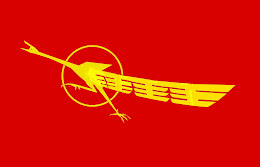





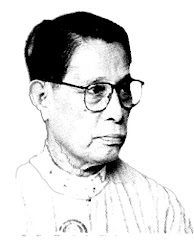


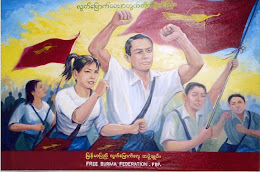





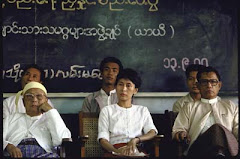

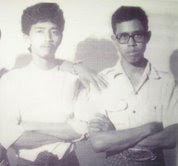

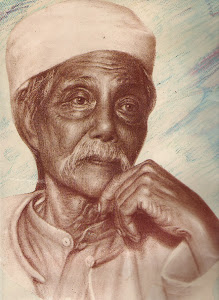
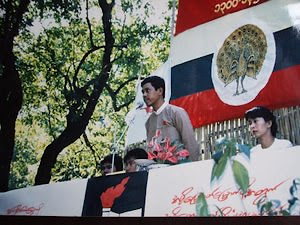
2 comments :
pity, nobody still understands her even after 23 years. the articles like this are so boring when we understand her politics.
It it a good analysis of Daw Suu's visit to Thailand and her actions.
She needs a good team to cover up all the subjects the author mentions.
The presidents of the country have a good team to work out things like these matter.If she is invited officially, she can prepare better and can expect exactly what to say, how to act and whom to meet. Now she is taking her chances whatever come.Besides she does not have the chance to select the tops people of the country like President can. She is working with the people who come along the way in bad time, loyal to her and she can not pick up someone better leaving the loyalist behind who may not be smart enough to advice her and policy especially if they are not good in English, so they can not be really helpful to her preparing speech, annoucement at news conference and so on. If she forget to mention somethings, none of her staff can remind her.
There should be a special staffs who are good in English and knowledge of politic affairs and communication for foregin trips. Now it seems she has to think alone what to say in ever event. She never used the paper for supports of her speech. I guess no one of her team knows what she is going to say.They will learn to have the concrete policy in the future, I hope.She has been playing her role outstanding anyway.Her party has to find the smart people to support her.It is a team work.Failure is not on her part but lacking a good team support.
Post a Comment